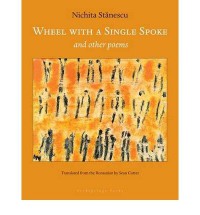Parrish Lantern's Casebook
Malt Whisky Drinking, Single Speed Bike Racing, Poetry Loving, Book-Fiend, & If This Makes Me Seem Cool, It's All In The Edit.
~~~
The Ideal Library Symbolizes Everything a Society stands for. A Society Depends On Its Libraries To Know Who it Is, Because Libraries Are Societies Memory (A. Manguel). This Is My Attempt To Construct My Ideal library.
The Ritual of Writing on Air

Nichita Stănescu (niˈkita stəˈnesku) was born Nichita Hristea Stănescu on 31st March 1933 in the city of Ploiesti (ploˈjeʃtʲ ) the county seat of Prahova County in the historical region ofWallachia, Romania, located about 35 miles north of Bucharest. His mother Tatiana Cereaciuchin, fled from Russia and in 1931 married Nicolae H. Stănescu, which was something he commented on several times, stating that he had been given life by a Romanian peasant and a Russian woman. Ploiesti was overrun by Nazi’s during the 2nd world war because of it’s oil refinery, which was eventually put out of commission by United States bombers.Nichita finished high school in Ploiesti, before moving to Bucharest to study Romanian, linguistics, philosophy, and literature. In 1952 he married Magdalena Petrescu, although this was to last only a year and in 1957 he graduated. His literary debut was in the Tribuna literary magazine, followed by his debut poetry collection Sensul iubirii (The Aim/Sense of Love*) in 1960, this was a collection of love poems which explore the meaning of love.Poems from the volume were previously published in the Tribuna, no. 6, 17 March 1957, and Gazeta literară, no. 12, 21 March 1957.
End Of An Air Raid
(April 5, 1944)
You dropped your chalk
and the splintered door beat against the wall
<<>>
the sky appeared, partly hidden
by the spiders
that fed on murdered children.
<<>>
Someone had taken away
the walls
……….and fruit tree
………………….and stairs.
<<>>
You hunted after spring
impatiently, like you were expecting
a lunar eclipse.
<<>>
Towards dawn, they even took away
the fence
you had signed with a scratch,
so the storks would not lose their way
when they came
this spring.
On June 6th 1962, he married for the second time, to Doina Ciurea, the marriage seems to have lasted for only two years although it wasn’t till the around 1981 that they divorced and Stănescu married for the third time in 1982 to Dora (Theodora bran) whom he had met in 1978 when she was a student in Philology, in the Department of French. Throughout this period Stănescu was a contributor to and editor of Gazeta Literară, România Literară and Luceafărul, as well as creating a extensive body of poetry, essays and Romanian translations of poets such Adam Puslojic and Vasko Popa. He also was the recipient of numerous awards for his verse, the most important being theHerder Prize in 1975 and a nomination for the Nobel Prize in 1980.
Beyond the dry as bone nature of the facts, Nichita Stănescu comes across as an outgoing gregarious individual, he seems to dispel the image of the lone writer working at his craft, preferring the company of others. He spent most of his time residing in the homes of his friends, enjoying copious amounts of drink and could regularly be found improvising poems whilst his audience attempted to follow him and transcribe them at the bar. In fact the title of this post is called “ The Ritual Of Writing On Air”because that was how he described his technique, drawing inspiration from his immediate environment, and using that to craft his verse, stating in a Belgrade interview that:
“Gutenberg flattened words out, but words exist in space … Words are spatialized. They are not dead, like a book. They are alive, between me and you, me and you, me and you. They live; they are spoken, spatialized, and received”
<<>>
While.
And yet, I have seen a bird
lay eggs while it flew --
And yet, I have seen someone cry
while he laughed --
And yet, I have seen a stone
while it was --
<<>>
In 1983 he died in Fundeni Hospital (Bucharest) after a liver condition he had had for some time worsened. He was posthumously elected a member of the Romanian Academy, although by this point he had a reached an envious position where both the critics and the general public had declared him as one of the most loved and prominent writers in the Romanian language, a language that he had himself declared was “Divinely Beautiful”.Despite living through the second world war and Romania’s fall into an oppressive police state under the dictatorship of Nicolae Ceauşescu, a regime characterized by an increasingly brutal and repressive apparatus and, by some accounts, the most rigidly Stalinist regime in the Soviet bloc. Stănescu was considered a metaphysical rather than a political poet, using this approach to examine the universe and humanity’s place within it, using various perspectives to voice the fundamental questions of his and our time. Also by walking a line between what could and could not be said, he crafted a new aestheticfor his verse, one that in his own words:
“ while the poems, often lapidary, appear to indicate a sublimation of the senses, a tendency to crystallize into a symbol, an attentive reading unveils the opposite process, that is the symbol’s subtle disaggregation, its incorporation into matter, something like the fissuring into a star of a pane of glass, broken by an invisible stone”
Meaning from the star, we notice the pane and intuit the stone. The pane registers the lines of fissure, which we might take as the lines of the poem, moving through the human language. We move from metaphor – the broken glass as star – toward the material yet abstract world, the stone that cannot be directly described in human language. (Taken from the translator’s afterword)



